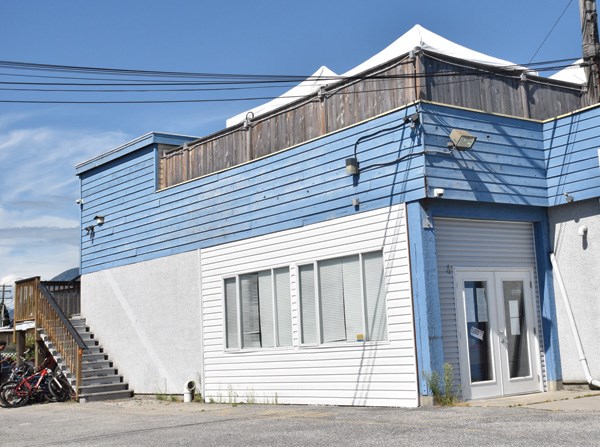The lower Sunshine Coast’s “first public safe consumption space” for people who use drugs has been set up in Sechelt.
The safe consumption site, which consists of a covered gazebo on the deck of the shelter in Sechelt, was opened last week in response to “activism from people who use drugs in our community, the increase in drug poisoning overdoses we are seeing and after hearing the challenges that drug users face in our community to create safety,” according to a memo from shelter operator RainCity Housing.
The Sechelt site is open daily and staffed by a mix of trained peers and people who use drugs as well as RainCity support workers. Vancouver Coastal Health (VCH) provides the training and the site is funded through an existing contract between VCH and RainCity Housing.
It’s equipped with harm reduction supplies and naloxone provided by the BC Centre for Disease Control. Additional supports are also available, including peer witnessing and counselling, overdose response and education, naloxone training, drug checking including take-home strips, information about safe supply, detox and treatment options and referrals to other agencies.
The outdoor site is also open for people who use inhalants.
A far more lethal drug supply and public health restrictions due to COVID-19 have caused a spike of drug poisonings and overdose deaths across the province, including on the Sunshine Coast, and while RainCity clients have had access to safe consumption, efforts have escalated recently to set up a public space.
Vancouver Coastal Health (VCH) and the Community Action Team (CAT) – a multidisciplinary group aimed at reducing the overdose risk in the community – approached RainCity about providing public access and more services at the shelter, according to the memo.
A survey of people who use drugs in Sechelt, conducted by CAT in June, found that 90 per cent of respondents had either overdosed or were at risk of overdose.
CAT project manager Meghan Burrows told Coast Reporter the public site is “long overdue” and that all partners are “extremely supportive and happy to see it being done.”
In June, Hawkfeather Peterson, president of BC / Yukon Association of Drug War Survivors, erected an unauthorized safe consumption site on private property across the from the Hightide Supportive Housing complex in Sechelt, and at the time said people who use drugs had been “begging” VCH for a low-barrier public site for more than two years.
District of Sechelt staff had been looking into possible locations for a sanctioned site, but with the public site now operational at the shelter, Mayor Darnelda Siegers told Coast Reporter that work is on hold.
“Part of what we need to look at with this one is to assess that it meets the need of the population that it’s looking to serve,” she said. “Until it’s been in operation we don’t know if it’s actually done that.”
Siegers, who is Sechelt council’s liaison to CAT, said the district is “supporting [VCH and CAT] as much as we can.”
Peterson, meanwhile, told Coast Reporter it’s “phenomenal” the site has been opened, but remains concerned about people who may be banned from accessing services through RainCity.
They want to establish an additional site “accessible to even our most at-risk people.”
“They absolutely should have this [site], I think it’s amazing,” Peterson said, “but it doesn’t meet the needs of everyone in the community, and I think that’s a big problem.”
RainCity staff confirmed people restricted from accessing the shelter because of “serious and immediate risk to the safety of either staff members or residents” would not be able to access the safe consumption site on the premises, but said such occurrences are rare.
“Most others who may have current or historic reduced or restricted access to the shelter or its services will be welcome at the Safe Consumption Site, and we’re committed to working with individual community members to ensure possible conflict is avoided while maintaining access to the service.”
In its memo, RainCity acknowledged “the challenges of offering safe consumption from a shelter, but we hope that folks will come to the safe consumption space and use this resource to keep themselves safe.”
A survey is underway in Gibsons as the CAT looks at options for safer drug use in that community and in Pender Harbour. A formal announcement from the CAT about the Sechelt site and those initiatives is expected next week.
In June, 175 people died after ingesting illicit drugs, making it the deadliest month for overdoses in B.C.’s history. The second deadliest month was May.



